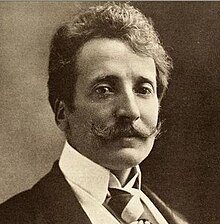Georges Rodenbach
Georges Raymond Constantin Rodenbach (born July 16, 1855 in Tournai , † December 25, 1898 in Paris , France ) was a Belgian poet and writer of symbolism who wrote in French.
Life
Georges Rodenbach was born as the son of Constantin Ferdinand Auguste Rodenbach from Bruges and his Walloon wife from Tournai . His great-grandfather Ferdinand Rodenbach came from Andernach in the Rhineland and worked as a military doctor. At the end of the 18th century, they immigrated to today's Belgium, which at that time still belonged to the Habsburg monarchy . Rodenbach's grandfather Constantin-François and three of his brothers were instrumental in the Belgians' struggle for independence against Dutch rule. George's father had studied philosophy in Paris and law in Brussels. He then worked as an official at the Weights and Measures Office in Ypres , Tournai, where he met his wife and Georges was born, and from the end of 1855 in Ghent .
In Ghent, Rodenbach, who later wrote in French, grew up in a purely Flemish environment. After attending secondary school, he attended the Collège Sainte-Barbe from 1866 . There he met Émile Verhaeren in 1868 as a classmate , who would become a lifelong friend. In 1874 he finished school with the final exam. During this time he wrote the story "Au Collège", in which he dealt with the rather dreary atmosphere of the school. After school he took up law studies at Ghent University , which he graduated with a doctorate in July 1878. During his studies, a first volume of poetry appeared in 1877 under the title "Le Foyer et le champs". At the request of his father, he went to Paris for a year after graduating, where he attended lectures on philosophy at the Sorbonne , but also worked as a lawyer. He also writes regularly “Lettres Parisienne”, which he publishes in the Catholic magazine “Le Paix” in Brussels. Poems from the year in Paris, which are also printed by French magazines, appear in 1879 under the title "Les Tristesses".
From 1880 Rodenbach worked as a lawyer in Ghent, but continued to work as a journalist and writer. His third volume of poetry, “La Mer élégante”, was published in 1881. In that year he also worked for the newly founded magazine “La Jeune Belgique”, whose editorial team mainly gathers younger Belgian authors. After disputes in the editorial team from 1886 on, he broke with the magazine in 1887. He had already moved to Brussels in 1883 , where he continues to work as a lawyer and journalist. The volumes of poetry "L 'Hiver mondain" (1884) and "La Jeunesse blanche" (1886) were published at that time. He later regards the latter as his first work of real literary importance. He gave up his legal work, which was not economically successful either. He was able to secure his livelihood through a position as secretary of the magazine "Le Progrès", for which he also regularly wrote the "Chroniques Bruxelloises".
After Le Progrès had been discontinued in 1888 for financial reasons, he received the offer to go to Paris as a correspondent for the most important Catholic daily newspaper "Journal des Bruxelles". An offer he immediately accepted. A few months later he married Anna-Maria Urbain, a Walloon Belgian, whom he had met in 1887 at a friend's house in Brussels, and with whom he had their son Constantin in 1892. During his time in Paris, which lasted until his death, he wrote a total of 481 letters from Paris, 330 of which were published in the Journal, 135 in "Le Patriote" and 16 in the "Journal de Genève". But he also published in “Figaro”, B. a four-part series of essays entitled “Agony of Cities”, which deals with the Dutch island of Walcheren and the Flemish cities, including Ghent and Bruges. In 1892 his main work " Bruges-la-Morte " appeared. He died on December 25, 1898 of acute appendicitis and was buried on the Cimetière du Père-Lachaise (Div. 15).
plant
Rodenbach published eight collections of poetry, four novels and numerous short stories, works for the stage and reviews. His best known work Das tote Brugge (1892) brought this city back to life for modern tourism and was used by Erich Wolfgang Korngold as the basis for his opera Die tote Stadt .
- The silent city (drama). The veil (dramatic poem) . Translator: Siegfried Trebitsch , Vienna 1902 online - Internet Archive
literature
- Jakob Elias Poritzky: Georges Rodenbach . In: Rein A. Zondergeld (Ed.): Phaïcon 4. Almanach der Fantastischen Literatur. Suhrkamp Taschenbuch Verlag (st 636), Frankfurt 1980, pp. 72-77.
- Hermann Weber , lawyers as non-German language writers: Georges Rodenbach , Neue Juristische Wochenschrift 2018, 749 ff.
Web links
- Literature by and about Georges Rodenbach in the catalog of the German National Library
- Works by Georges Rodenbach in the Gutenberg-DE project
- Review of the new edition Bruges tote Stadt (2003) on hr-online
Individual evidence
- ↑ a b c d e Hermann Weber : “Jurists as writers of non-German language: Georges Rodenbach”, in: Neue Juristische Wochenschrift , issue 11/2018, pages 749 ff.
- ↑ Translated into German by Friedrich von Oppeln-Bronikowski under the title “In der Schule” and published in 1913.
- ↑ Camille Lemonnier , also a writer and also his client, stated that Rodenbach's lawyers' fees in Brussels were limited to eight gray cylinders that a hatter had given him instead of an agreed fee.
- ↑ Translated into German by Friedrich von Oppeln-Bronikowski under the title “Das tote Brugge” and published in 1902.
| personal data | |
|---|---|
| SURNAME | Rodenbach, Georges |
| ALTERNATIVE NAMES | Rodenbach, Georges Raymond Constantin |
| BRIEF DESCRIPTION | Poet and writer of symbolism |
| DATE OF BIRTH | July 16, 1855 |
| PLACE OF BIRTH | Tournai , Belgium |
| DATE OF DEATH | December 25, 1898 |
| Place of death | Paris |

